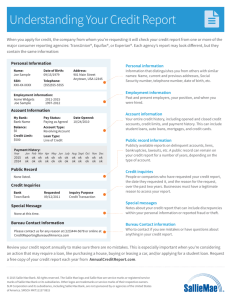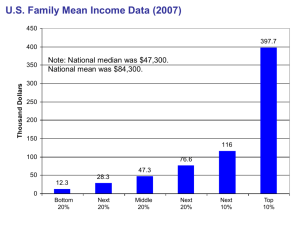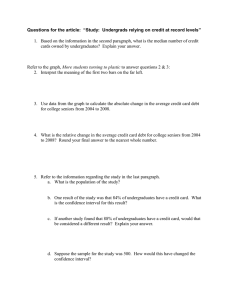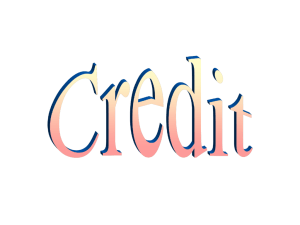UD ecide
advertisement
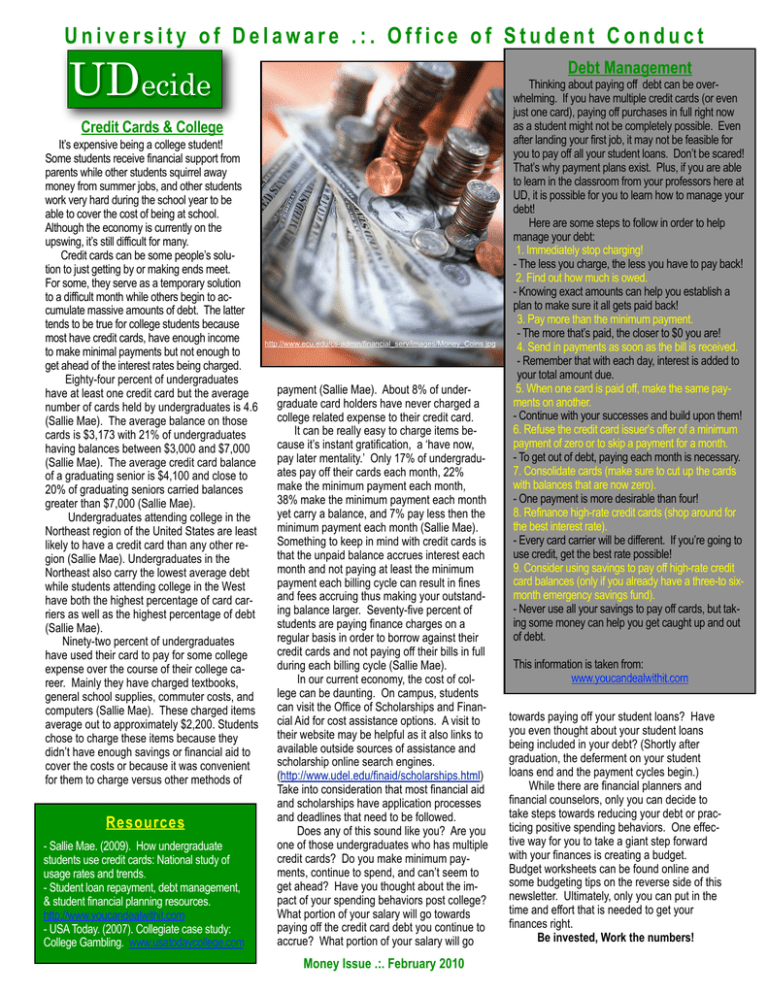
University of Delaware .:. Office of Student Conduct UDecide Debt Management Credit Cards & College It’s expensive being a college student! Some students receive financial support from parents while other students squirrel away money from summer jobs, and other students work very hard during the school year to be able to cover the cost of being at school. Although the economy is currently on the upswing, it’s still difficult for many. Credit cards can be some people’s solution to just getting by or making ends meet. For some, they serve as a temporary solution to a difficult month while others begin to accumulate massive amounts of debt. The latter tends to be true for college students because most have credit cards, have enough income to make minimal payments but not enough to get ahead of the interest rates being charged. Eighty-four percent of undergraduates have at least one credit card but the average number of cards held by undergraduates is 4.6 (Sallie Mae). The average balance on those cards is $3,173 with 21% of undergraduates having balances between $3,000 and $7,000 (Sallie Mae). The average credit card balance of a graduating senior is $4,100 and close to 20% of graduating seniors carried balances greater than $7,000 (Sallie Mae). Undergraduates attending college in the Northeast region of the United States are least likely to have a credit card than any other region (Sallie Mae). Undergraduates in the Northeast also carry the lowest average debt while students attending college in the West have both the highest percentage of card carriers as well as the highest percentage of debt (Sallie Mae). Ninety-two percent of undergraduates have used their card to pay for some college expense over the course of their college career. Mainly they have charged textbooks, general school supplies, commuter costs, and computers (Sallie Mae). These charged items average out to approximately $2,200. Students chose to charge these items because they didn’t have enough savings or financial aid to cover the costs or because it was convenient for them to charge versus other methods of Resources - Sallie Mae. (2009). How undergraduate students use credit cards: National study of usage rates and trends. - Student loan repayment, debt management, & student financial planning resources. http://www.youcandealwithit.com - USA Today. (2007). Collegiate case study: College Gambling. www.usatodaycollege.com http://www.ecu.edu/cs-admin/financial_serv/images/Money_Coins.jpg payment (Sallie Mae). About 8% of undergraduate card holders have never charged a college related expense to their credit card. It can be really easy to charge items because it’s instant gratification, a ‘have now, pay later mentality.’ Only 17% of undergraduates pay off their cards each month, 22% make the minimum payment each month, 38% make the minimum payment each month yet carry a balance, and 7% pay less then the minimum payment each month (Sallie Mae). Something to keep in mind with credit cards is that the unpaid balance accrues interest each month and not paying at least the minimum payment each billing cycle can result in fines and fees accruing thus making your outstanding balance larger. Seventy-five percent of students are paying finance charges on a regular basis in order to borrow against their credit cards and not paying off their bills in full during each billing cycle (Sallie Mae). In our current economy, the cost of college can be daunting. On campus, students can visit the Office of Scholarships and Financial Aid for cost assistance options. A visit to their website may be helpful as it also links to available outside sources of assistance and scholarship online search engines. (http://www.udel.edu/finaid/scholarships.html) Take into consideration that most financial aid and scholarships have application processes and deadlines that need to be followed. Does any of this sound like you? Are you one of those undergraduates who has multiple credit cards? Do you make minimum payments, continue to spend, and can’t seem to get ahead? Have you thought about the impact of your spending behaviors post college? What portion of your salary will go towards paying off the credit card debt you continue to accrue? What portion of your salary will go Money Issue .:. February 2010 Thinking about paying off debt can be overwhelming. If you have multiple credit cards (or even just one card), paying off purchases in full right now as a student might not be completely possible. Even after landing your first job, it may not be feasible for you to pay off all your student loans. Don’t be scared! That’s why payment plans exist. Plus, if you are able to learn in the classroom from your professors here at UD, it is possible for you to learn how to manage your debt! Here are some steps to follow in order to help manage your debt: 1. Immediately stop charging! - The less you charge, the less you have to pay back! 2. Find out how much is owed. - Knowing exact amounts can help you establish a plan to make sure it all gets paid back! 3. Pay more than the minimum payment. - The more that’s paid, the closer to $0 you are! 4. Send in payments as soon as the bill is received. - Remember that with each day, interest is added to your total amount due. 5. When one card is paid off, make the same payments on another. - Continue with your successes and build upon them! 6. Refuse the credit card issuer's offer of a minimum payment of zero or to skip a payment for a month. - To get out of debt, paying each month is necessary. 7. Consolidate cards (make sure to cut up the cards with balances that are now zero). - One payment is more desirable than four! 8. Refinance high-rate credit cards (shop around for the best interest rate). - Every card carrier will be different. If you’re going to use credit, get the best rate possible! 9. Consider using savings to pay off high-rate credit card balances (only if you already have a three-to sixmonth emergency savings fund). - Never use all your savings to pay off cards, but taking some money can help you get caught up and out of debt. This information is taken from: www.youcandealwithit.com towards paying off your student loans? Have you even thought about your student loans being included in your debt? (Shortly after graduation, the deferment on your student loans end and the payment cycles begin.) While there are financial planners and financial counselors, only you can decide to take steps towards reducing your debt or practicing positive spending behaviors. One effective way for you to take a giant step forward with your finances is creating a budget. Budget worksheets can be found online and some budgeting tips on the reverse side of this newsletter. Ultimately, only you can put in the time and effort that is needed to get your finances right. Be invested, Work the numbers! University of Delaware .:. Office of Student Conduct Budgeting Tips Gambling - Write out all your expenses You can do it in an excel spread sheet, on a piece of paper, or on a worksheet that you can download online. In any form, writing things out allows for you to see where your money is going so that you can better manage what you spend your money on and where money may be better spent. - Use online tools and calculators You can find tools and calculators online easily by googling budgeting or debt management. Certain websites, like You Can Deal With It offer many tools and resources that may make budgeting easier. Check out : http://www.youcandealwithit.com/budgeting_tools/index.shtml - Try not to spend on credit If you’re not charging purchases and instead are using cash or your debit account, then you are only spending money that you have. If you practice making purchases with money that you have, then you are not running the risk of accruing exorbitant amounts of debt and interest fees. - Allot specific amounts of money for specific things. Then, stick to those amounts! Shopping on a budget can be difficult, but it’s definitely doable! Use store flyers to check prices and get coupons, buy store brands instead of name brands, and purchase things when they are on sale. Shopping at places like Wal-Mart can also save you money. - Find cheaper alternatives. Do things for free (or almost free) on campus! There is always something happening on campus that will cost you nothing or next to nothing. SCPAB has events that are free or under $5. Events through out the year and information about these events can be found here:http://www.udel.edu/studentevents/ - Save! If you have extra money, don’t blow it because you have it. Save it to try to get ahead of payments, for next months bills, or for something that you really want but at this moment don’t have the funds to purchase. Plus when you have money saved, it provides both security and flexibility. Gambling is risky. If you’re under 21, you’re not allowed to gamble in casinos or place bets in races at parks. But there aren’t regulations on entering into pools or placing informal bets with your friends. Sure, for some, gambling can be profitable and life-changing. But for most, it is simply throwing money away. Gambling may be found on campus in its informal form with students entering into a March Madness or Super Bowl pool, placing bets on games between friends, or even placing bets with bookies about the outcomes of sporting events. Some individuals can get caught up in gambling trying to get ahead while some even develop an addiction to it. Organizations exist that can help. USA Today lists some questions that you can ask yourself if you think gambling may be an issue: • Are you missing classes because of gambling? • Do you have trouble focusing in class because you’re thinking about gambling? Are your grades suffering? • Do you purchase books to help you become a • more skillful bettor? Or do you spend a significant amount of time reading up about betting online? • Are you facing more debt than you can handle? • Are you selling valuables to have money to bet? • Are you watching more TV sports? Calling 900 numbers? Becoming unduly emotional over sporting events? • Are you depressed? Anxious? Withdrawn? Saving Money There are some really easy ways that you can save money while you’re at college. Most of them are easier than you might think! ✓Budget: Know how much money you’re working with and then allot set amounts for each area in your life. Make sure to set aside some money not being used for bills to be saved! ✓Walk, Bike, or Carpool to Campus: This combines exercise and environmentally friendly ways for you to save on gasoline! ✓ Get good grades: If you do own a car, insurance is cheaper when you excel academically. ✓ Look for cheap or free entertainment: There is always something happening on campus. It’s just a matter of you seizing those opportunities! ✓ Don’t pay for a fitness membership: While you might have to wait on line to use a machine in the campus gym, it’s free! Spend the time you wait with flash cards for class, reflecting on life, or being mindful and centered about your work out. ✓ Quit Smoking: Cigarettes are very expensive. If you quit, you’re taking a positive step for both your health and your checkbook. Office of Student Conduct Contact Information 218 HULLIHEN HALL NEWARK, DE 19716 TELEPHONE: 302.831.2117 WEBSITE: WWW.UDEL.EDU/STUDENTCONDUCT/ EMAIL: STUDENT-CONDUCT@UDEL.EDU ✓ Use Coupons and Shop Sales/Specials: Almost everything goes on sale at some point. If you were creative enough, you don’t have to pay full price for anything that you wish to buy. ✓ Don’t grocery shop when hungry: You tend to purchase much more than you need if you shop while hungry. Eat prior to going and then you will only purchase what you need. ✓ Use your dining plan or cook in your apartment instead of eating at a restaurant: You pay for the meal plan on campus just like you pay for your groceries. Eat what you’ve already purchased instead of going out to a restaurant and purchasing more food! ✓ Utilize free internet when possible: Almost everywhere on/around campus has a Wi-Fi connection. Use that instead of paying for it on your own if you live off campus. ✓Make coffee instead of purchasing it: Make it and bring it with you in a reusable coffee mug. You’re not only saving money on coffee but being sustainable using a reusable mug! ✓ Read articles online, don’t print or copy: Copies are expensive. So is paper and ink if you’re using your own printer. Read things online and take notes in your notebook making reference to the source. You can always revisit the article, web page, or book online when studying for a test or writing a paper. ✓ Purchase a laundry rack: This will save you money on drying your clothes. Air drying is just as effective and far more cost effective. ✓ Seek out the best prices on textbooks: Do a little research and buy things used! This will help you get the best price possible over purchasing things brand new all the time. ✓ Be smart about how you use credit: Building credit is important. Accruing debt isn’t. Spending only money that you know you have to pay off Money Issue .:. February 2010 If you answered ‘yes’ to any of these questions or you recognize these behaviors in friends of yours, help is available. On campus contact Wellspring 302-831-3457 or visit their website at www.udel.edu/wellspring. You can also contact the Delaware Council on Gambling Problems 888-850-8888 or visit their website at: www.dcgp.org. Gamblers Anonymous is a 12-step program focused on helping those with gambling addictions. Visit their website at: http://www.gamblersanonymous.org. Look for more information around campus about National Problem Gambling Awareness Week March 7- March 13, 2010. the bills is one way to make sure you’re not getting over your head. ✓ Get a free student checking/savings account: Most banks offer enrolled students free checking and/or saving accounts. You can save a lot of money in annual fees with a free account. ✓ Apply for financial aid: Scholarships and grants are funds that you don’t have to repay once you’re done with school. Apply for as many as possible to help defray the cost of college!

